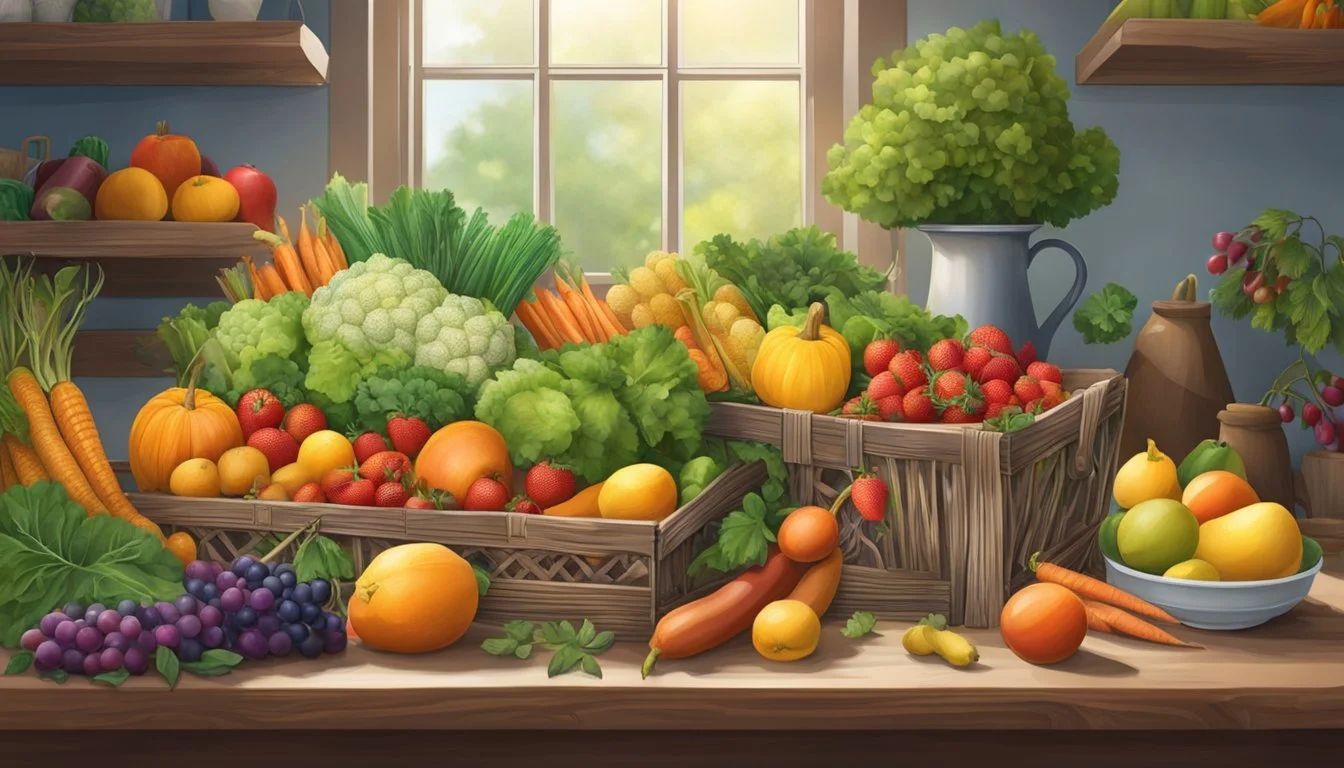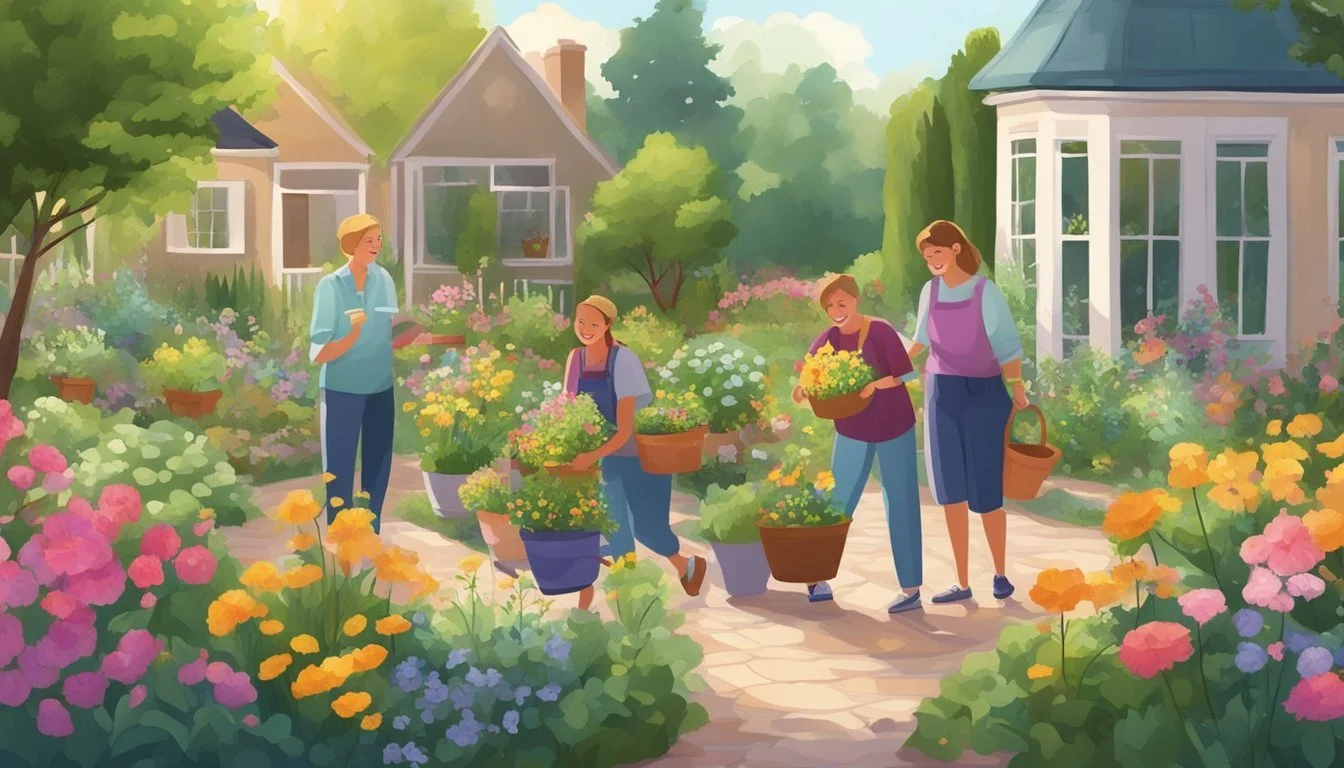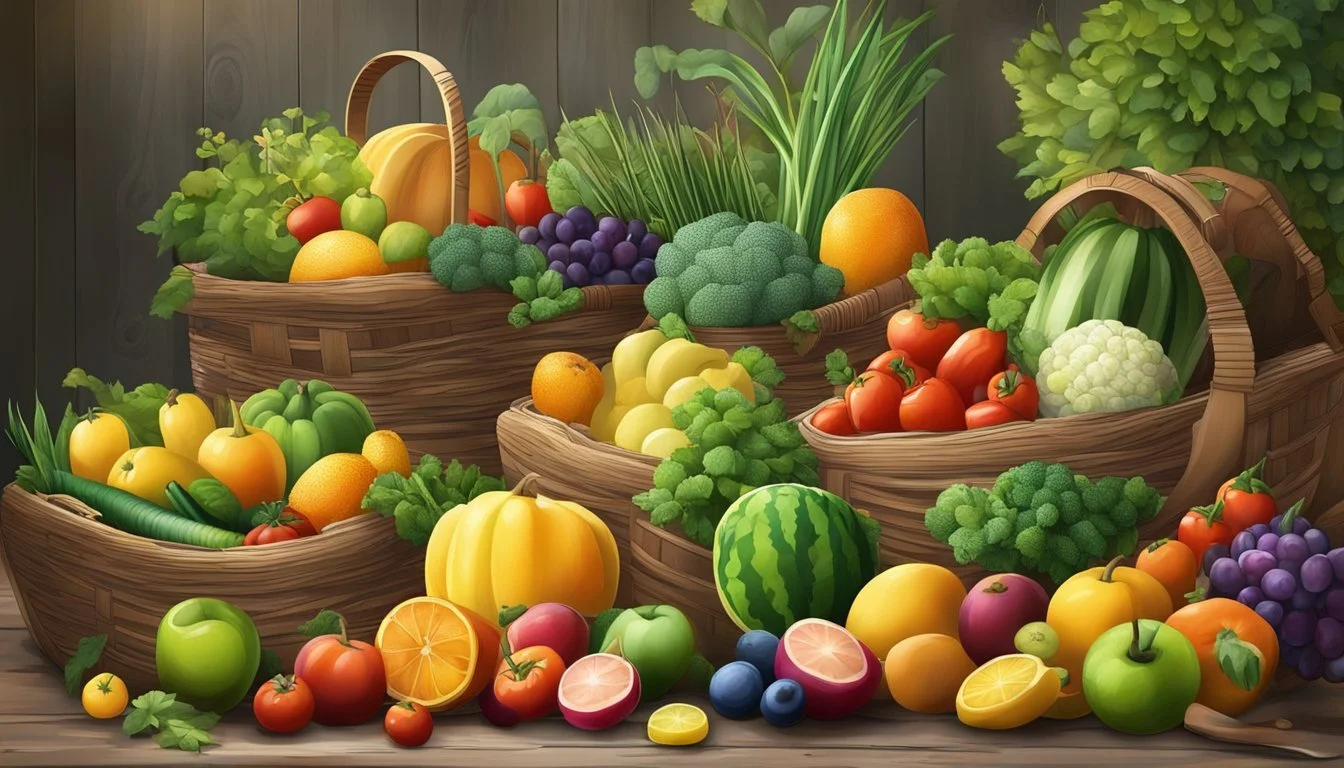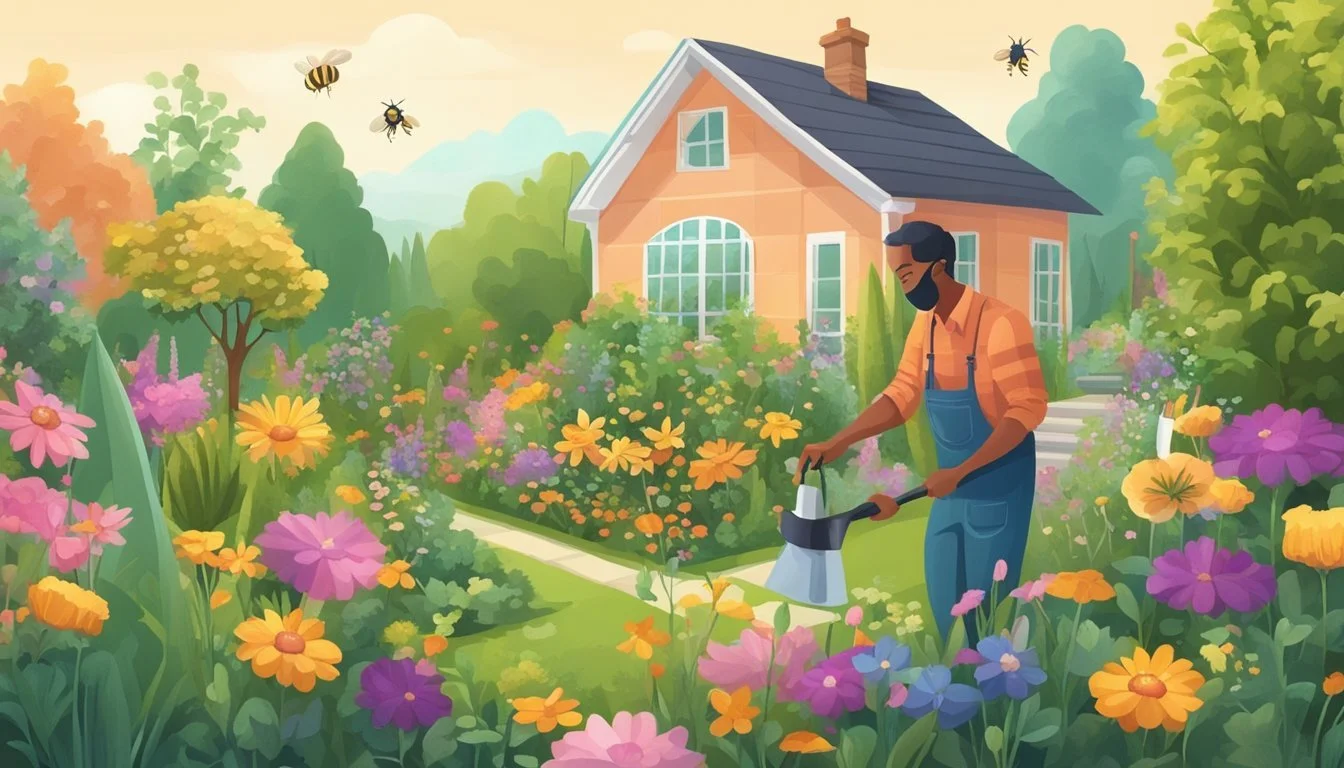11 Reasons Why Having a Friend Who Loves to Garden Elevates Your Life
Having a friend who loves to garden can bring unexpected joy and benefits into your life. It's not just about having someone to share fresh produce with; it's about gaining a connection to nature and a new perspective on life.
Gardening enthusiasts often have a calming presence and a wealth of knowledge about plants, health, and the environment. Their passion for nurturing life can inspire those around them to appreciate the simple, yet profound, joys of spending time outdoors.
1) They Share Fresh Produce
Friends who love to garden often have an abundance of fresh produce. This bounty allows them to share a variety of fruits and vegetables.
Freshly grown produce from a garden is often more flavorful than store-bought options. The taste difference can make meals more enjoyable.
Sharing fresh produce also promotes healthier eating habits. When fresh fruits and vegetables are easily accessible, it's more likely they will be incorporated into daily meals.
Gardeners often grow unique varieties of fruits and vegetables. This can introduce friends to new flavors and encourage culinary experimentation.
Community spirit grows when friends share their garden harvest. It strengthens bonds and creates opportunities for people to gather and connect.
Excess produce can be shared with those in need. This generosity can make a positive impact in the local community.
Sharing garden produce also cuts down on food waste. Instead of letting surplus crops go bad, gardeners can distribute them to friends and neighbors.
Receiving fresh produce from a friend's garden saves money. It reduces grocery bills and provides high-quality ingredients at no extra cost.
Garden produce is often grown without harmful pesticides. This means the shared fruits and vegetables can be healthier and safer to eat.
Growing and sharing fresh produce fosters a sense of achievement. Gardeners can take pride in their ability to provide natural, homegrown food to those they care about.
Gardening friends enrich the lives of others by offering fresh, homegrown produce. It’s a small gesture with big benefits.
2) Learn Unique Gardening Tips
Having a friend who loves to garden opens the door to a plethora of unique gardening tips you might not find in standard guides. They often share personal experiences, which can be incredibly valuable.
For instance, they might suggest using crushed eggshells as a natural fertilizer. This adds calcium to the soil and helps deter pests.
They might also recommend companion planting, a method where certain plants are grown together to benefit each other. For example, planting marigolds near tomatoes to keep harmful insects away.
Another tip could involve creating homemade compost from kitchen scraps. This not only reduces waste but enriches the soil, promoting healthier plant growth.
A gardening friend may advise on timing for planting. Knowing the best times to plant different vegetables can significantly affect yield and plant health.
They might also suggest trying unique garden layouts, such as vertical gardening for small spaces. This maximizes the use of limited space and can be visually appealing.
Additionally, they might explain the benefits of using coffee grounds in the garden. Used coffee grounds can improve soil structure and are an excellent source of nitrogen.
Having a gardening enthusiast friend means continual learning and discovering new, helpful gardening techniques.
3) Free Aromatic Herbs and Flowers
Having a friend who loves to garden often means receiving fresh, aromatic herbs and flowers as gifts. These gifts can range from a handful of basil and rosemary to a bouquet of lavender or marjoram.
This generosity adds both beauty and fragrance to any home. Aromatic herbs are perfect for cooking, enhancing the flavor of various dishes while also providing health benefits.
Flowers like honeysuckle and jasmine can fill any room with a delightful scent. Plus, these aromatic plants often attract beneficial insects and pollinators, making your garden more vibrant and healthy.
Not only do you save money on buying herbs and flowers, but you also get to enjoy the fresh, high-quality produce grown with care.
4) Get Hands-On Experience
Having a friend who loves to garden gives you the opportunity to gain hands-on experience. They can show you the best techniques for planting and maintaining different types of plants. This kind of practical knowledge is invaluable and can only be truly learned through direct involvement.
Your friend might invite you to join them in their gardening endeavors. As you work together, you'll learn about soil preparation, planting seasons, and proper watering methods. This direct engagement helps solidify your understanding of gardening concepts.
Participating in gardening activities can also teach you about the diverse range of plants and their specific needs. From vegetables to flowers, each type offers unique lessons. You might even get to try your hand at organic gardening, learning how to create a sustainable ecosystem in your own backyard.
Working alongside an experienced gardener can help you quickly identify and solve common gardening problems. Whether it's dealing with pests or understanding nutrient deficiencies, your friend’s expertise will guide you through. This experience not only makes you more skilled but also boosts your confidence in managing a garden on your own.
In addition, joining in these activities can provide a sense of accomplishment. Each plant you help grow is a testament to your learning and efforts. The hands-on practice ensures that you’re not just learning theory but applying it practically in real-time gardening situations.
5) Create a Meditation Space
Gardeners have a unique ability to create serene meditation spaces. They often know how to balance plant varieties and colors to avoid a "busy" aesthetic. This promotes calmness and tranquility.
By including elements like rocks and Asian-style decor, gardeners can enhance the peaceful atmosphere. Water features such as small ponds or fountains provide soothing sounds that aid relaxation.
Selecting a quiet corner with minimal distractions is key. Gardeners often choose locations with plenty of shade and privacy. This ensures a comfortable and undisturbed meditation experience.
Incorporating natural elements like stones or certain plants can add to the sanctuary feel. These elements help create a space where the mind can unwind and find peace.
Surrounding the meditation area with specific plants can further buffer noise. This enhances the meditative atmosphere and provides a sense of isolation from everyday stress.
6) Enjoy Homegrown Teas
Having a friend who gardens offers the delightful benefit of enjoying homegrown teas. They can grow a variety of herbs and plants, perfect for brewing fresh, flavorful teas at home. Mint, chamomile, and lemon balm are popular choices that thrive in many gardens.
Homegrown teas not only taste better but also retain more nutrients. Fresh herbs used in making tea often have higher concentrations of beneficial compounds compared to store-bought varieties. These teas can be soothing and therapeutic, helping to relieve stress and improve well-being.
Herbal tea blends can be customized to personal tastes or specific health needs. A friend who loves gardening may experiment with different combinations, sharing unique blends that you might not find commercially. Popular options include a relaxing mint tea or an invigorating ginger and lemon blend.
Additionally, homegrown tea minimizes exposure to pesticides and other chemicals often found in commercially grown herbs. By using herbs straight from the garden, you ensure that your tea is as natural and pure as possible. It's a healthier choice for those looking to avoid additives.
Growing herbs for tea also supports sustainability. It reduces the need for packaging and transportation associated with store-bought teas. Sharing these eco-friendly practices with a gardening friend can inspire others to consider more sustainable beverage choices.
For more information on growing your own herbal teas, visit Empress of Dirt's guide.
7) Encourage Eco-Friendly Practices
Gardening often leads to adopting eco-friendly habits. Seeing the benefits of sustainable gardening can inspire others to incorporate environmentally responsible choices into their daily lives.
They might start composting kitchen waste, reducing the amount of trash sent to landfills. Additionally, they can see the importance of using organic methods, minimizing the use of harmful pesticides that affect the ecosystem.
Sharing these practices with friends can have a ripple effect. For example, setting up swaps to keep items out of the landfill can become a community activity.
Social media can be a powerful tool. Opening an Instagram account to showcase sustainable methods can engage followers and inspire them to incorporate these habits into their own routines. This kind of visual sharing demonstrates practical and easy steps to being more environmentally conscious.
Simple actions like conserving water or using energy-efficient tools can also make a significant impact. When friends witness the obvious benefits, they might be encouraged to apply similar eco-friendly practices in their own lives. In this way, the love for gardening can foster a broader commitment to environmental sustainability.
8) Be Part of Garden Projects
Having a friend who loves to garden opens the door to participating in various garden projects. These projects can range from planting new flowers and vegetables to designing garden layouts.
Garden projects often require collaboration and creativity. Working together on these tasks can strengthen bonds and create lasting memories. It's a chance to learn new skills and share knowledge about different plants and growing techniques.
Being involved in garden projects also provides an opportunity to contribute to community gardens. These gardens bring people together and create shared green spaces. For example, community gardens offer places where people can grow, eat, and share traditional foods, preserving cultural heritage and fostering a sense of belonging.
Collaborating on garden projects allows friends to experience the benefits of gardening, such as reducing stress and promoting mindfulness. Engaging in physical activity outdoors can improve mental health and enhance overall well-being.
In addition, garden projects can include workshops and classes on various gardening topics. These gatherings can be educational and social, providing a platform for exchanging ideas and techniques. The seating areas in these gardens often become central hubs for community interaction and learning.
Participating in garden projects with a friend can be a rewarding and enriching experience, as it combines the joys of friendship with the pleasures of nurturing nature.
9) Gain Seasonal Produce Knowledge
Having a friend who loves to garden can be an invaluable resource for learning about seasonal produce. They can explain which fruits and vegetables thrive in different seasons. This knowledge helps in choosing the freshest produce available.
In-season vegetables and fruits are usually more nutrient-dense. Your friend can guide you on what to look for at farmers' markets during different times of the year. This ensures you get the most out of your purchases.
A gardening enthusiast can also help you identify cost-effective produce options. Seasonal fruits and vegetables are generally more abundant. This abundance leads to lower prices, offering more bang for your buck.
They might even introduce you to less common seasonal foods. Learning about unique produce such as spring leeks or fresh peas, which add flavor and nutrition to your meals, is valuable.
Understanding when to plant different crops is another aspect your gardening friend can share. This information not only broadens your food knowledge but may also inspire you to start your own garden. Having this insight aids in planning your meals around what’s currently in season.
Their expertise can make grocery shopping more intentional. By relying on their seasonal produce knowledge, you can make healthier, more sustainable choices.
10) Inspire Outdoor Activities
Having a friend who loves to garden can inspire others to engage in outdoor activities. They often serve as role models for incorporating fresh air and physical exercise into daily routines.
Gardening enthusiasts can encourage friends to join them in various gardening tasks. This includes planting, watering, and harvesting. These activities not only promote physical fitness but also provide opportunities for bonding and relaxation.
Additionally, gardeners often motivate others to explore different aspects of nature. They might introduce friends to hiking, bird watching, or simply enjoying a picnic in a local park. These activities offer a break from digital screens and foster a deeper connection with the outdoors.
Engaging in outdoor activities inspired by a gardening friend can improve overall mental and physical health. Being outside has been shown to reduce stress and anxiety. This is due to both the fresh air and the calming effects of nature.
Gardening friends can also share knowledge about the benefits of spending time outside. They can explain how outdoor activities can improve mood and increase energy levels. This information can inspire others to make more time for nature in their lives.
Ultimately, a friend who loves to garden can inspire a more active and nature-connected lifestyle, benefiting everyone involved.
11) Boost Mood with Garden Visits
Having a friend who loves to garden offers unique opportunities to boost your mood. Spending time in a garden provides a sense of tranquility and peace that can be hard to find elsewhere.
Nature has a calming effect that helps reduce stress and anxiety. Walking through a lush, green space and enjoying the colors and scents can be incredibly soothing.
Gardening activities, such as planting or weeding, provide gentle physical exercise. This kind of movement releases endorphins, the body’s natural mood lifters, making you feel more positive and energetic.
Being in an outdoor garden surrounds you with natural beauty, which enhances mindfulness. The sights, sounds, and smells help you stay present and focused, reducing negative thoughts.
The time spent in a garden can also provide a sense of accomplishment. Whether you help with planting or simply admire the thriving plants, the progress and growth are rewarding.
Gardens often become a social hub, strengthening connections with others. Sharing this relaxing environment with friends fosters deeper relationships.
Moreover, fresh air and sunlight are natural mood boosters. Exposure to sunlight increases vitamin D levels, which is linked to improved mood and mental health.
Visiting a garden allows one to disconnect from daily stresses and digital distractions. The natural setting encourages a mental break, reducing burnout.
Lastly, gardens can offer a space for personal reflection. The peaceful environment promotes thoughtfulness and emotional balance, contributing to overall well-being.
The Therapeutic Benefits of Gardening
Gardening offers numerous therapeutic benefits, positively impacting both mental and physical health. Engaging with nature and caring for plants encourage a healthier lifestyle.
Mental Health Improvements
Gardening has been shown to significantly improve mental well-being. Regular engagement with gardening activities can help reduce stress, alleviate anxiety, and diminish symptoms of depression.
Spending time in green spaces promotes relaxation and mindfulness, which are crucial for maintaining mental health. The act of nurturing plants can boost self-esteem, providing a sense of accomplishment and purpose. Exposure to sunlight while gardening also helps increase serotonin levels, further improving mood and mental well-being.
Interacting with other gardeners can enhance social connections, fostering a supportive community. Gardens can be a peaceful sanctuary where individuals can escape daily stressors.
Physical Health Benefits
Gardening is an excellent form of physical exercise. Tasks such as digging, planting, and weeding are beneficial for cardiovascular health. This physical activity helps strengthen muscles, improve flexibility, and boost overall fitness levels.
Regular gardening can help maintain a healthy weight and reduce the risk of chronic diseases. It encourages spending time outdoors, which can increase vitamin D levels from sunlight, essential for bone health and immune function.
Growing one's own vegetables also promotes healthy eating, providing access to fresh, nutritious produce. This can lead to improved dietary habits and better overall health.
Environmental Contributions of Gardening
Gardening offers significant benefits to the environment. It helps increase local biodiversity and promotes sustainable agricultural practices that are essential for ecological balance.
Boosting Local Biodiversity
Gardening encourages the growth of a variety of plants, which creates habitats for different species of insects, birds, and other wildlife. Diverse plant life supports a wider range of creatures, helping to maintain a balanced ecosystem. For example, planting native flowers and shrubs can attract pollinators like bees and butterflies, which are crucial for fertilizing many crops.
Moreover, gardens can serve as safe spaces for small animals and insects, providing them with food and shelter. In urban areas, community gardens help to reintroduce greenery and thereby enhance local biodiversity. Community gardens contribute to the urban ecosystem by fostering a diverse range of plant and animal life in otherwise sparse environments.
Sustainable Practices
Gardening often employs sustainable practices such as composting, organic farming, and water conservation. Composting kitchen scraps and garden waste reduces the amount of organic waste in landfills and enriches soil quality. This not only cuts down on greenhouse gas emissions but also improves soil fertility, making gardens more productive.
Using organic methods to control pests and diseases, like introducing beneficial insects, avoids the negative impacts of chemical pesticides on the environment. Additionally, many gardeners set up rainwater harvesting systems to water their plants, reducing reliance on municipal water supplies. These practices collectively lower the garden's carbon footprint. Gardening acts as a carbon sink, absorbing CO2 and mitigating the effects of climate change, while also promoting cleaner air.
Building Stronger Communities
Having a friend who loves to garden can significantly enhance social connections and contribute to building stronger communities. Shared green spaces and community gardens play pivotal roles in fostering these communal benefits.
Shared Green Spaces
Shared green spaces in neighborhoods offer vital areas where residents can gather, relax, and engage in outdoor activities. These spaces create opportunities for spontaneous social interactions and community events.
Green spaces also promote mental well-being by providing a natural environment that alleviates stress and fosters relaxation. Regular interaction in such settings strengthens social bonds, making neighborhoods more cohesive and supportive.
Maintenance and care of green spaces often require communal efforts, encouraging collaboration and shared responsibility among residents. This teamwork builds a sense of pride and ownership in the community.
Community Gardens
Community gardens are essential in connecting people and fostering a sense of belonging. They serve as hubs where individuals can grow vegetables, herbs, and flowers, contributing to food sovereignty and healthy eating habits.
Participating in community gardens helps residents learn about agriculture and sustainability, enhancing their appreciation for nature. These gardens often break down social barriers, bringing together people from diverse backgrounds to share gardening tips and experiences.
Moreover, community gardens often have strong support networks involving partnerships with local organizations and a dedicated volunteer base. These collaborations amplify the gardens’ impact, providing valuable resources and fostering a robust community spirit.
Creating and maintaining such gardens require teamwork, enabling people to forge lasting friendships and connections that strengthen the fabric of the community.












